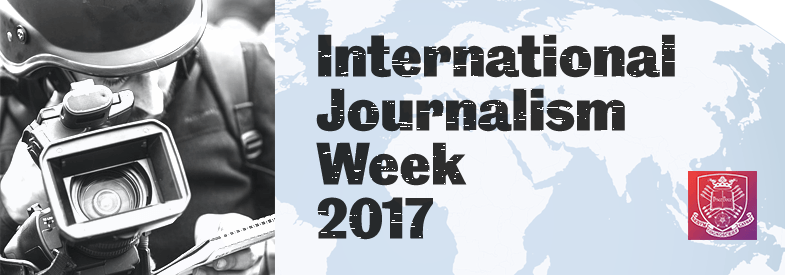 This November the Department of Journalism Studies once again hosts International Journalism Week: a unique forum offering students and staff in five days of debate and networking on the issues that connect journalism educators, researchers and practitioners around the globe. This is our sixth series of talks, events and workshops related to the main theme of the week: The Value of Freedom of Speech and Expression.
This November the Department of Journalism Studies once again hosts International Journalism Week: a unique forum offering students and staff in five days of debate and networking on the issues that connect journalism educators, researchers and practitioners around the globe. This is our sixth series of talks, events and workshops related to the main theme of the week: The Value of Freedom of Speech and Expression.
The main event on Wednesday is hosted by the Centre for Freedom of the Media (CFOM), based at the Department of Journalism Studies. To mark the International Day to End Impunity, the Centre for Freedom of Media will host this special event focused on justice for victims of crimes against journalists.
Guy Berger, Director of the Freedom of Expression and Media Development Division of UNESCO, will speak on the theme ‘Your right to know relies on justice for journalists under attack’. The lecture, which is open to all students and staff of the University, will be followed by an open Panel discussion with international journalists and experts. They will share their knowledge and experiences on the dangers and barriers of the working environment for journalists. The discussion will highlight the combined efforts of UNESCO, other UN bodies, governments and other key stakeholders to create a safe environment and to combat impunity.
Guy Berger is Director for Freedom of Expression and Media Development at UNESCO. He is responsible for the Organization’s global work on press freedom, safety of journalists, internet freedom, media pluralism and independence, gender and media, media and information literacy, and journalism education. He has also worked in both press and television and had a long-running column on the Mail & Guardian website. Besides that, Guy Berger was the deputy chair of the South African National Editor’s Forum. Read more on what UNESCO are doing to mark the 2016 ‘Day to End Impunity’: http://en.unesco.org/day/endimpunity
William Horsley, CFOM’s International Director and chair of the panel said: “The CFOM lecture and debate is about how the environment for journalists in many parts of the world has grown more risky and hostile than ever. A new generation of journalists needs a toolkit of survival skills that take account of the fact that the media have become a key battleground in fierce contests for power. The expert panel will share their insights into how best to be prepared. CFOM is a long-standing partner of UNESCO for implementing the UN Action Plan on the Safety of Journalists and the Issue of Impunity.”
Another highlight of International Journalism Week is the competition awards evening taking place on Thursday. Over the last 4 weeks students in the Department have been submitting their entries, addressing the question Why is freedom of speech and expression important for journalism?
Our Judges, Chris Elliot, Reader’s Editor of the Guardian and Jonathan Grun, Emeritus Professor of the Press Association will award prizes to the best three entries. The creators of the top three submissions will each be presented with the fantastic opportunity to visit and spend time in a leading UK media organisation. The winning entries will also be published on the Department of Journalism Studies website.
Students will be given the opportunity to take part in our second annual case study challenge themed ‘Journalism in Danger’.
Marie Colvin and James Foley murdered in Syria. The staff of Charlie Hebdo gunned down in Paris. Daniel Pearl kidnapped and killed in Pakistan. Peter Greste and colleagues jailed for their reporting in Egypt. In country after country, journalism is under attack. Reporters are being censored, jailed and sometimes even killed as they pursue our right to know what’s going on in an increasingly volatile world. And far too often the censors and aggressors get away it. During the case study challenge students will explore how freedom of expression and freedom to know are under threat in different parts of the world. Students will work in small groups and will present their work on Friday, at the close of IJW 2016. The presentations will be judged by members of our academic staff and the best three will be awarded certificates of achievement.
7th-11th November 2016
Programme: http://www.sheffield.ac.uk/journalism/events/ijw16/programme


